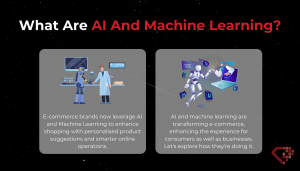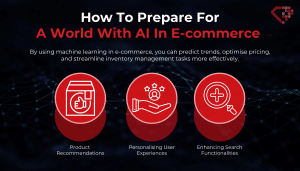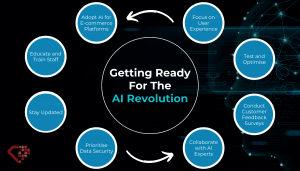Looking at the next chapter of online shopping, two forces are making big waves: Artificial Intelligence (AI) and Machine Learning. With many of our clients in the e-commerce field, we at Ruby Digital aim to be at the vanguard of these transformations. Ensuring our clients are not only familiar with, but also effectively leveraging the benefits of AI and Machine Learning, is very important to us.
AI doesn’t merely signify machines doing smart tasks – it’s about enhancing user experiences, making processes more efficient, and allowing businesses to tap into levels of data analytics previously thought impossible.
For e-commerce businesses, this isn’t just the future – it’s now. The fusion of AI and ecommerce is reshaping online shopping, offering customers personalised experiences, smarter product suggestions, and more efficient customer service.
Join us as we delve deeper into this exciting progression, showcasing how AI is revolutionising e-commerce and how, with Ruby Digital’s expertise, we can help brands harness the full potential of this digital renaissance!
What are AI and Machine Learning?
AI (Artificial Intelligence) refers to machines performing tasks that traditionally required human involvement. From understanding human speech to playing complex games, AI has branched out across various sectors, making processes more efficient and smarter.
Machine Learning, a subset of AI, is the science of training machines to improve their performance by learning from data, rather than through explicit programming. It’s essentially teaching computers to learn from experience.
Now, e-commerce brands are starting to draw on the strengths of both AI and Machine Learning. This integration is transforming our shopping experiences, providing personalised product suggestions, and enabling smarter online operations. In this post, we’ll unpack this evolution, exploring how AI is making e-commerce more intuitive and beneficial for businesses and consumers alike.

Advances in Machine Learning and AI in Ecommerce: Potential Benefits for Retail Brands
The potential benefits of machine learning and AI for ecommerce platforms are quickly becoming evident:
- Enhanced User Personalisation: With machine learning algorithms, e-commerce platforms can personalise user experiences in real-time. This means showing products or content relevant to user preferences and browsing behaviour.
- Improved Inventory Management: AI-driven predictive analysis can forecast demand, helping e-commerce brands maintain optimal stock levels, minimising overheads, and ensuring customer satisfaction.
- Data-Driven Insights: AI tools can sift through vast amounts of data, helping brands understand their customers better, leading to more informed business decisions.
- Automated Customer Support: AI-powered chatbots provide instant customer support, reducing response times and enhancing the user experience.
- Fraud Detection: Machine learning algorithms can detect unusual patterns and potentially fraudulent activities, safeguarding both businesses and customers.
- Visual Recognition & Enhanced Search: The integration of AI allows users to search for products using images. This visual search capability improves user experience by offering an intuitive way of finding products without the need for textual queries.
- Recommendation Engines: Beyond mere personalisation, recommendation engines employ AI to suggest products based on user behaviour, browsing patterns, and purchase history. These recommendations can significantly boost sales by prompting users with relevant product suggestions.
- Dynamic Pricing Strategies: AI enables e-commerce brands to adjust product prices in real-time, considering factors like demand, competition, and historical data. This strategy ensures competitiveness and maximises profitability.
- Voice-Activated Shopping: The rise of smart assistants means a growing number of consumers are using voice commands for shopping. E-commerce brands are leveraging AI to optimise for this trend, making shopping even more seamless.
- Improved Security Protocols: Beyond fraud detection, AI enhances overall site security. It monitors for potential threats, safeguards user data, and ensures a safe shopping environment.
By integrating these AI and machine learning features, e-commerce brands are poised to offer an unmatched shopping experience, driving growth and fostering loyalty among their customers.
The Effect of AI on E-commerce: Real-life Impacts on Customers
The merger of AI with e-commerce has not only transformed the way businesses operate but has also considerably enhanced the shopping experience for customers. Here are some real-world examples:
- ‘MyRoutine AI’ by La Roche-Posay: Offering personalised skincare advice, this tool harnesses AI to recommend skincare routines tailored to individual user profiles.
- Hungryroot’s Recipe Rotation: Machine learning lets Hungryroot adjust and suggest recipes based on individual preferences and shopping habits.
- IBM’s ‘Watson’ joins forces with North Face: This AI integration allows users to find the perfect jacket by analysing their needs and preferences, resulting in a more tailored shopping experience.
- Chatbots & Virtual Assistants: Many e-commerce platforms use AI-driven chatbots for frontline customer service, ensuring users get quick answers to queries and enjoy a smoother shopping journey.
- Tailored Product Recommendations: AI analyses user behaviour to suggest products. For instance, if a user frequently buys sports gear, the platform may recommend new arrivals in that category.
These advances underscore the evolution of online shopping. For customers, it’s no longer about simply making a purchase – it’s about an experience tailored to their individual preferences. And for brands, AI offers a gold mine of opportunities to enhance operations, better understand customers, and elevate their shopping journey.?
How to Prepare for a World with AI in E-commerce
Artificial Intelligence is no longer the stuff of sci-fi movies. It’s real and it’s evolving fast. From virtual assistants like Siri and Alexa to customer service chatbots and predictive analytics, AI’s influence is pervasive. Machine learning, a subset of AI, thrives on data, continuously refining its algorithms for better outputs.
AI in e-commerce has seen burgeoning growth. Platforms leverage AI for product recommendations, enhancing search functionalities, and personalising user experiences. Machine learning in e-commerce helps predict trends, optimise pricing, and streamline inventory management.
While the integration of artificial intelligence and machine learning in e-commerce might sound like the beginning of a dystopian future to some, we see the potential for a future teeming with innovation.
As we pivot towards an AI-centric shopping environment, both businesses and consumers can anticipate remarkable transformations.

Getting Ready for the AI Revolution
Convinced but not sure where to start? Here are some pointers for brands and consumers:
For Companies:
- Adopt AI for E-commerce Platforms: Brands should consider integrating AI tools and functionalities into their online platforms. This could range from chatbots for immediate customer interactions to AI-driven data analytics to identify user behaviour.
- Educate and Train Staff: With the rise of AI in e-commerce, companies must ensure that their teams are equipped with the knowledge to harness its benefits. This includes training sessions and workshops centred on AI functionalities.
- Stay Updated: The world of AI is ever-evolving. E-commerce businesses should keep an eye on the latest trends, ensuring their platforms remain at the forefront of innovation.
- Prioritise Data Security: As brands begin to rely more on AI and machine learning, the importance of safeguarding user data intensifies. Implement robust security measures and be transparent with customers about how their data is used.
- Collaborate with AI Experts: Consider partnering with AI specialists or tech firms to better integrate AI into the e-commerce experience. External expertise can provide insights and solutions that may not be immediately apparent internally.
- Conduct Customer Feedback Surveys: As you implement AI features, gather feedback from your users. Understand their experience with the new AI functionalities and iterate based on their inputs.
- Test and Optimise: AI in e-commerce should not be a ‘set and forget’ strategy. Regularly test the AI features, gather insights, and make the necessary adjustments to maximise benefits.
- Focus on User Experience: While AI offers numerous functionalities, always ensure that the primary focus remains on enhancing the user experience. AI should simplify processes and make shopping more enjoyable for users.
By taking these proactive steps, e-commerce brands can seamlessly integrate AI and machine learning into their platforms, unlocking new levels of efficiency and customer satisfaction.
For Users:
- Embrace Change: Consumers should recognise the benefits of machine learning in the e-commerce sphere, from more accurate product recommendations to quicker customer service responses.
- Stay Informed: As AI tools become standard on shopping platforms, users should familiarise themselves with these features to make the most of their shopping experiences.
- Get Privacy Aware: While AI can enhance the shopping experience, users should also be conscious of their data privacy. It’s essential to understand what data is being collected and how it’s used.
Far from the daunting “Terminator scenarios” we might imagine, the integration of artificial intelligence and machine learning in e-commerce offers significant benefits, reshaping the way we shop and interact online. As we move into this new era, preparation and education will be key to harnessing its vast potential.

In Closing
The dawn of artificial intelligence and machine learning in e-commerce isn’t just an emerging trend – it’s a transformative shift that’s reshaping the very core of online shopping. For customers, it’s about experiencing a more personalised, efficient, and intuitive shopping journey. For businesses, it’s about harnessing data-driven insights, enhancing operations, and delivering unmatched value.
From smarter product recommendations to lightning-fast customer service responses, AI and machine learning have already drastically altered how people use the internet. These technologies not only streamline the shopping experience but also pave the way for more informed decision-making for both consumers and brands.
Of course, as with all technological shifts, navigating the intricacies of AI in e-commerce requires expertise and foresight. This is where Ruby Digital steps in! As champions in the digital realm, we’re poised to assist and guide South African e-commerce brands, ensuring they tap into the full potential of AI and machine learning.
With us by your side, the future of e-commerce not only looks promising, but can potentially elevate your brand to unparalleled heights. Embrace the change, and let’s craft the future of e-commerce together!



